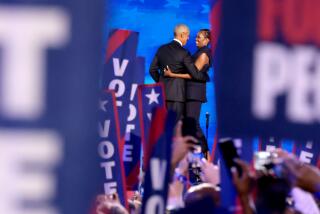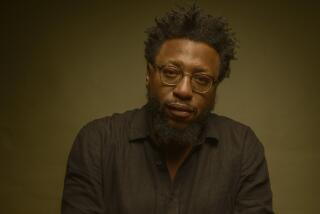In a perilous time, president returns to a personal tone
- Share via
Reporting from Washington — An old cast of characters will appear in President Obama’s speeches throughout the rest of the political season and beyond, an array of figures like his war veteran grandfather, his resourceful single mother and his physically disabled yet triumphant father-in-law.
Also appearing will be Barack Obama himself — not just the president intent on explaining his policies and plans, but also the man who introduced himself and his life story to Americans two years ago.
It’s a subtle shift for White House message makers as they begin working more of the president’s personal reflections into his speeches and appearances.
The strategy reflects an acknowledgement that the historic voter coalition that elected Obama in 2008 has frayed as his approval ratings have sagged. At the same time, as he spends more of his public time explaining national policies and problems, critics have moved in to try to define his personal story line, perhaps stoking unfounded suspicions that he is a Muslim or is not American-born, aides feel.
The effort to bring back a more personal Obama also comes as the White House moves to counter a looming disaster for Democrats in the November election. By showing the traits that wooed voters two years ago, Obama may be better able to aid embattled Democratic candidates as he steps up his campaign travel.
Still, it’s not a reprise that comes with ease. Aides say Obama does not favor the idea of personal displays from the commander in chief.
In addition, the process of governing does not lend itself to folksy overtures the way campaigning does. “You don’t get as many opportunities to do that within the bubble of the presidency — to talk about it the way you do in a campaign — because you’re talking about specific policy issues, legislative votes and crises,” one administration official said.
Or, as Republican strategist Mark McKinnon put it: “Obama is no longer the shiny object.”
Presidential advisors say they are trying to incorporate more personal storytelling, but also to deepen the conversation as time goes on. Later this fall, Obama is releasing his first children’s book, titled “Of Thee I Sing: A Letter to My Daughters.”
The Obama story began returning in the president’s appearances last week. He and First Lady Michelle Obama are where they are today, goes one story, because their families worked tirelessly to give them a better life.
His grandfather marched off to Europe in World War II, according to another story, while his grandmother worked in factories on the home front. The president recounts how Michelle Obama’s father trudged off to his job as a city worker each day — even after multiple sclerosis required him to use crutches.
Students of Obama’s speeches have heard many of those stories. But the president is now willing to let speechwriters pour a little more of his life into the reminiscence.
In his back-to-school speech last week, Obama told students about how he had slacked off in high school. He intended it as a confession made to those who, he said, probably knew where he was coming from.
His high school grades slipped, and he was guilty of being a “goof-off,” to his mother’s displeasure.
“She decided to sit me down and said I had to change my attitude,” he recalled. “I was like, you know, I don’t need to hear all this. I’m doing OK, I’m not flunking out.”
Eventually, though, he said his mother’s words had their intended effect and he exerted more effort. The moral: Even if they’ve slid backward, students can always get back on track.
A major question is whether voters will be moved by the personal touch. Before now, some experts had noted a certain lack of feeling in Obama’s presentation.
“It’s as if you’re talking to a very intelligent law professor and government official who really knows the issues and wants really hard to tell you why you should be persuaded of his position,” said David Halperin, a speechwriter for former President Clinton. “I think that Obama does stand for some important values, and he could do more to stress the values and give the speeches more inspirational language.”
Other presidents also have struggled with self-revelation. Democratic strategist Paul Begala recalled a rare personal story by former President George H.W. Bush during a 1988 convention speech in which Bush spoke about coming home from World War II and heading to Texas in a station wagon. The story helped middle-class voters relate to him, Begala said.
“President Obama has always been more reticent to incorporate his personal story into his public message,” said Begala, who advised Clinton, a master of personal connection with audiences. “I do think voters want to know that a leader’s issue agenda is authentic, that his or her agenda is shaped by his or her values. Incorporating one’s personal story bolsters that.”
As he marked the Sept. 11 observances, Obama called on Americans to turn away from religious divisions, adding that he understands spiritual passions “as somebody who relies heavily on my Christian faith in my job.”
The spiritual reference was noteworthy. The first family attended church near the White House on Sunday, but religion is a subject Obama has kept almost entirely private since he took office. Obama has not made a show of attending church on Sundays, choosing either to go to private worship services at the presidential retreat at Camp David, Md., or simply to read or play golf.
During the presidential campaign, he spoke on religion in the midst of a furor over controversial comments by his former pastor, the Rev. Jeremiah A. Wright Jr. But as president, he has rarely addressed it.
Perhaps as one result, a recent Pew Research Center poll showed a growing number of Americans think Obama is a Muslim, while a declining proportion say he is a Christian. And 20 months into his presidency, a plurality of Americans do not know what religion Obama follows, the survey showed.
For months, opponents have tried to describe Obama in negative ways. Former Republican House Speaker Newt Gingrich recently endorsed an extreme view of Obama as someone who believes in “Kenyan anti-colonialism.” A stronger sense of connection with Americans conceivably could help Obama counter such descriptions and carry out his vision for the country.
“Most of us cannot relate to making life-or-death decisions about sending troops into battle,” Begala said. “But all of us can relate to stories of family, faith and values.”
cparsons@latimes.com
More to Read
Get the L.A. Times Politics newsletter
Deeply reported insights into legislation, politics and policy from Sacramento, Washington and beyond. In your inbox twice per week.
You may occasionally receive promotional content from the Los Angeles Times.










